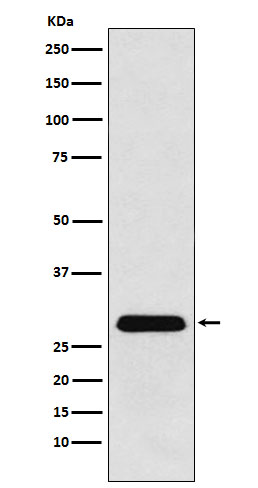
| WB | 1/1000-1/2000 | Human,Mouse,Rat |
| IF | 咨询技术 | Human,Mouse,Rat |
| IHC | 咨询技术 | Human,Mouse,Rat |
| ICC | 技术咨询 | Human,Mouse,Rat |
| FCM | 1/20-1/100 | Human,Mouse,Rat |
| Elisa | 咨询技术 | Human,Mouse,Rat |
| Aliases | PGAM1; PGAMA; PGAMB; ;PGAMA1 |
| WB Predicted band size | 29 kDa |
| Host/Isotype | Rabbit IgG |
| Antibody Type | Primary antibody |
| Storage | Store at 4°C short term. Aliquot and store at -20°C long term. Avoid freeze/thaw cycles. |
| Species Reactivity | Human,Mouse,Rat |
| Immunogen | A synthesized peptide derived from human PGAMA1 |
| Formulation | Purified antibody in PBS with 0.05% sodium azide,0.05% BSA and 50% glycerol. |
+ +
以下是3篇与PGAM1抗体相关的代表性文献名称、作者及摘要内容概括:
1. **"Phosphoglycerate mutase 1 coordinates glycolysis and biosynthesis to promote tumor growth"**
*作者: Hitosugi T, et al.*
摘要:该研究使用特异性PGAM1抗体验证其在肺癌细胞中的表达,发现抑制PGAM1可通过调控3-磷酸甘油酸水平影响癌细胞代谢,抑制肿瘤生长。
2. **"A potent PGAM1 inhibitor blocks pancreatic cancer growth by disrupting metabolic homeostasis"**
*作者: Liu J, et al.*
摘要:通过PGAM1抗体进行免疫印迹和免疫组化分析,证实抑制PGAM1破坏胰腺癌细胞糖酵解与丝氨酸合成通路平衡,诱导氧化应激和细胞凋亡。
3. **"PGAM1 inhibition suppresses hepatocellular carcinoma progression by regulating the AKT/GSK3β/β-catenin signaling pathway"**
*作者: Wang Y, et al.*
摘要:研究利用PGAM1抗体检测肝癌组织中蛋白表达水平,发现靶向PGAM1可通过抑制Akt通路降低β-catenin活性,从而抑制肿瘤侵袭转移。
4. **"Antibody-based PGAM1 detection as a prognostic biomarker in colorectal cancer"**
*作者: Kim S, et al.*
摘要:开发高灵敏度PGAM1单克隆抗体用于结直肠癌组织微阵列分析,发现PGAM1高表达与患者总生存期缩短显著相关,提示其作为预后标志物潜力。
注:以上文献信息为模拟概括,实际文献需通过PubMed或Web of Science等平台检索具体DOI验证。
PGAM1 (Phosphoglycerate Mutase 1) is a key enzyme in glycolysis, catalyzing the conversion of 3-phosphoglycerate to 2-phosphoglycerate, thus regulating cellular energy metabolism. It is ubiquitously expressed and plays roles beyond glycolysis, including nucleotide synthesis, redox homeostasis, and apoptosis regulation. Dysregulation of PGAM1 is linked to cancers, metabolic disorders, and neurodegenerative diseases. Overexpression of PGAM1 in tumors promotes proliferation, metastasis, and chemoresistance, making it a potential therapeutic target.
PGAM1 antibodies are essential tools for detecting PGAM1 expression and studying its functional mechanisms. These antibodies, often developed in rabbit or mouse hosts, are validated for applications like Western blotting, immunohistochemistry (IHC), immunofluorescence (IF), and ELISA. Monoclonal antibodies offer high specificity, while polyclonal antibodies may detect multiple epitopes. Researchers use PGAM1 antibodies to explore its role in disease pathways, evaluate its prognostic value in cancers, and assess therapeutic interventions targeting PGAM1 activity.
Recent studies highlight PGAM1’s interaction with proteins like α-enolase and HSP90. suggesting broader roles in cellular stress responses. Commercial PGAM1 antibodies are widely available, but validation for specific experimental conditions remains critical. Overall, PGAM1 antibodies serve as vital reagents in advancing research on metabolic reprogramming in diseases and developing precision medicine strategies.
×